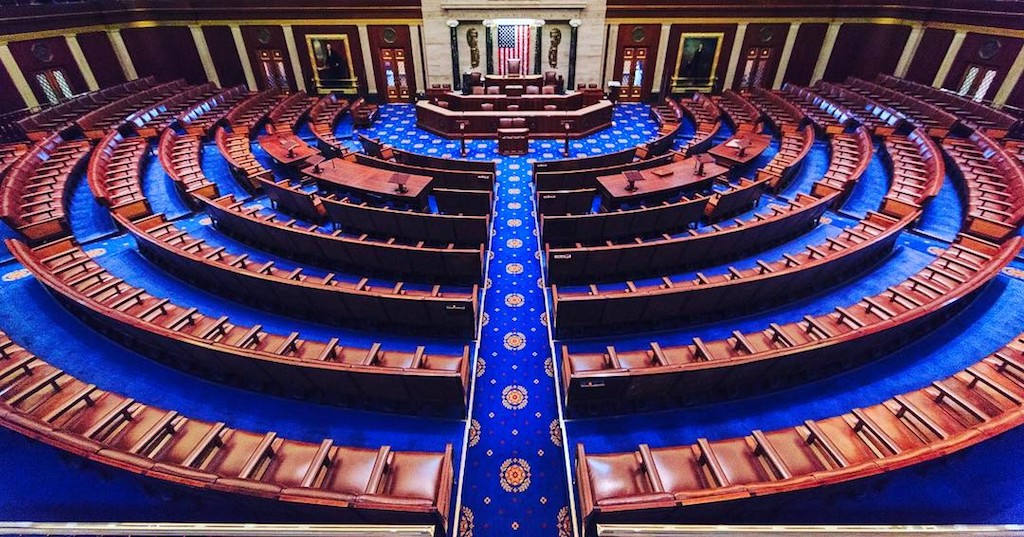Why Are Representatives Clamoring to Join the House Intelligence Committee?
Whichever party triumphs in the Nov. 6 midterm elections, the House Permanent Select Committee on Intelligence will have some new members when the 116th Congress convenes in January 2019. And according to a recent story in Politico, members of both parties are enthusiastically pursuing the available openings.

Published by The Lawfare Institute
in Cooperation With

Whichever party triumphs in the Nov. 6 midterm elections, the House Permanent Select Committee on Intelligence will have some new members when the 116th Congress convenes in January 2019. And according to a recent story in Politico, members of both parties are enthusiastically pursuing the available openings. Reportedly, as many as 70 Republican House members may be interested in joining the committee—reflecting a surge in attention toward a traditionally oversight-minded body that has recently transformed into one of the main attractions in the partisan battle over the Mueller investigation.
Two dynamics appear to be at play here. The first is a story about demand: Simply put, more members of the House are interested in serving on the intelligence committee. To the extent that this trend is real, it could mark an important shift in how members view service on the committee. Historically, sitting on the panel hasn’t been the highest priority for many members, in part because it is unlikely to confer electoral benefits. For members who care about getting reelected, the intelligence committee’s jurisdiction doesn’t lend itself well to tangible legislative victories that benefit one’s specific constituents. Members such as Rep. Dutch Ruppersberger (D-Md.), whose district is home to the National Security Agency and U.S. Cyber Command headquarters at Fort Meade, are an exception: He became the first House Democratic freshman appointed to the committee in 2003 and served on the panel for 12 years, including four as the committee’s top Democrat.
In addition, members who do serve on the panel can’t easily make the specifics of their service part of their reelection efforts. As one congressional staffer told political scientist Amy Zegart as part of a study of congressional intelligence oversight, “legislators can’t go and hold intelligence awareness fund-raisers in the district.”
But also important are dynamics on the supply side—that is, the factors that are creating the openings for these newly enthusiastic members to fill. As the Politico article notes, several of the current Republican members of the House intelligence committee are retiring from the chamber this year, but several others stand to vacate their positions because House rules limit members’ tenure on the committee to four terms in any period of six successive Congresses. Only the Committee on the Budget and the Committee on Ethics (which does not handle legislation) have similar tenure limitations, making the intelligence committee a relative outlier in limiting the service of its members, under House rules, to a certain number of terms.
The figure below shows that this has unsurprising consequences for the average length of time intelligence committee members have spent on the panel. For each Congress dating back to 1993, the figure compares the average number of terms members have spent on the intelligence committee (the green squares) to two other quantities: the average number of terms that representatives have served on the House’s other committees relevant to national security (the Committee on Armed Services, the Committee on the Judiciary, the Committee on Oversight and Government Reform, and the Committee on Foreign Affairs), displayed as the grey triangles, and the overall chamber average for legislative committees, indicated as blue circles. For each Congress, the average committee experience for members of the intelligence panel is noticeably less than for their colleagues on other committees—sometimes by, on average, as much as two terms.

Given that it takes members time to develop expertise in the issue areas handled by the committees on which they serve, the shorter tenures of intelligence committee members may have negative consequences for the committee’s effectiveness. Studying term limits imposed in 1992 by Republicans for committee leaders across the House, political scientists Alan Wiseman and Craig Volden suggest this may be the case. Wiseman and Volden show that between 1973 and 2014, longer service as a committee chair was generally associated with higher levels of effectiveness at getting legislation passed. For the first three terms of service, Republican and Democratic chairs were roughly as effective as one another. But Democratic chairs who served four or more terms saw greater increases in their effectiveness during the later part of their terms. Republican chairs were, on average, less effective than their Democratic equivalents who served longer terms.
Tenure limitations were initially imposed for both the Senate and House intelligence committees at their creation in 1976 and 1977, respectively. The arguments in their favor generally run along two lines. First, proponents of tenure limits were concerned about the possibility that congressional overseers would become captured by the intelligence community if the former served too long in a position supervising the latter. As Sen. Abe Ribicoff (D-Conn.) argued on the floor during debate over the creation of the Senate panel in 1976, “I think there is a basic wisdom in making sure that no member stays on this committee too long, and thereby loses his interest, becomes indifferent to the problems and an apologist for the intelligence community.” Second, some argued that ensuring rotation of new members on and off of the committee would facilitate the flow of fresh ideas and perspectives into intelligence community oversight.
But by the mid-1990s, it was clear that the tenure limitations might be undermining the House and Senate panels’ ability to engage in effective oversight. A House intelligence committee staff study to review the “role, function, and structure of the Intelligence Community”—known as IC21—concluded that “although the reasons for which [the committee] was made a select committee with tenure limits may have been valid in 1977, these may no longer be compelling or valid.” Multiple other contemporaneous sets of recommendations for intelligence community reform also suggested that both chambers’ committees eliminate the restrictions on how long members could serve. The issue was still ripe in 2004 when the 9/11 Commission also recommended eliminating tenure limitations, arguing that doing so would allow members to “accumulate expertise.” In the end, only the Senate did so; the House’s restrictions remain.
What explains the persistence of the tenure limitations? In the Senate’s case, some of the delay appears to be related to garden-variety turf wars within the chamber. In 1996, for example, an effort to eliminate the Senate intelligence committee’s tenure limits received unanimous support from the committee itself but was removed from the fiscal 1997 intelligence authorization bill over a jurisdictional conflict with the Senate Committee on Rules and Administration that threatened to slow down the measure’s progress.
Other power politics within the chambers are also likely at play. As a memo to 9/11 Commission Vice Chair Lee Hamilton from Commission Senior Counsel and Team Leader Chris Healey explained: “it is my understanding that Senator [Tom] Daschle [D-S.D.] opposed the last attempt to abolish the term limits [on the Senate intelligence committee] because he did not want to give up his prerogative to make a new appointment to the Committee at the end of a Senator’s term”—influence he had as the chamber’s Democratic leader. Given that appointments to the House intelligence committee are at the discretion of the speaker of the House and the minority leader for their respective caucuses, a similar, power-based calculus may help explain why tenure limitations have persisted for the House intelligence committee.
The House intelligence committee has certainly had a turn in the spotlight during the current Congress, and if Democrats hold a majority in the chamber come January, it may play a central role in the increased oversight efforts the party has promised. Recognizing the committee’s particular institutional structure will be important in assessments of its effectiveness in accomplishing not just this task but also any efforts to reverse the increasing politicization of the panel. Institutionalized turnover can have consequences as members try to build relationships and expertise—both of which are necessary for a committee to function well.





